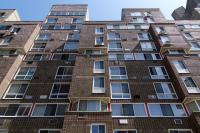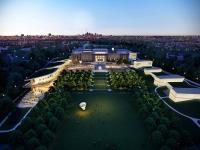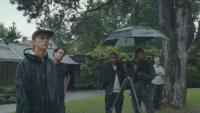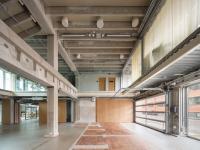Moses Mabhida Stadium
Durban, South Africa
The main idea of the lighting design is a clarity in light distribution, with conceptional focus on tree areas:
1. the membrane roof and the grandstands
2. the big arch
3. the podium and the ambulatories
The ceiling illumination is done by fluorescent lamps wit a neutral white light colour. A point-shaped light source would mirror the roof drapes in a confusing play of shadows, destroying the clear roof landscape.
The beam angles were limited in a way that neither the interior nor the exterior area receives disturbing stray light. Unfortunately, this is not the case with the floodlights, which were planned and realized by the manufacturer.
The luminaires for illuminating the membrane roof are situated in the catwalk. There are three different light lines with overlapping fields of light, providing an even full-coverage lighting across the whole membrane.
The luminaires for lighting the grandstand are also positioned in the catwalk, and are also equipped with fluorescent lamps, though with a warm colour of light. Due to elaborate cut-off angles, the light do not cause glare, even though they are positioned high above eye level.
The outer flanks of the arch, possessing a height of approximately 6 metres, are highlighted by LED light lines which are constructed in a way that the single light dots are invisible for viewers. Only across the longitudinal axis, few light dots could be perceived, within a very limited angular range. The LEDs can be controlled by a DMX interface, so that dynamic effects can be achieved, such as plays of intensity, gradients, or raising comets that hit each other at the peak of the arch.
The podium is lit up from the roof edge. The luminaires, equipped with metal halide lamps, are constructed in a way that their beam angles are strictly limited to the border of the parapet. Pillars are not hit. As the position of the luminaire towards the podiums differs, nine different light distributions are needed. If the pillars received stray light at their bottom parts, the apparent lightness of the construction would vanish and the warm “heart” of the stadium lighting could not shimmer through towards the outside, past the dark silhouettes of the confining pillars. Against this background, the light-technical requirements for the inner ambulatories are similar: The beam angles are strictly limited, preventing the pillars from being accidently highlighted. The red walls receive a full-coverage illumination by means of wallwashers.
All luminaires were developed by Conceptlicht, whereas development means not only luminaire design, but the determination of all relevant information for manufacturers, including the calculation of reflector coordinates.
- Lighting Designers
- CONCEPTLICHT
- Location
- Durban, South Africa
- Year
- 2009
- User
- Ibhola Lethu Concortium, Westville
- Architect
- gmp · Architekten
- Team CONCEPTLICHT
- Helmut Angerer, Jan Nielse










